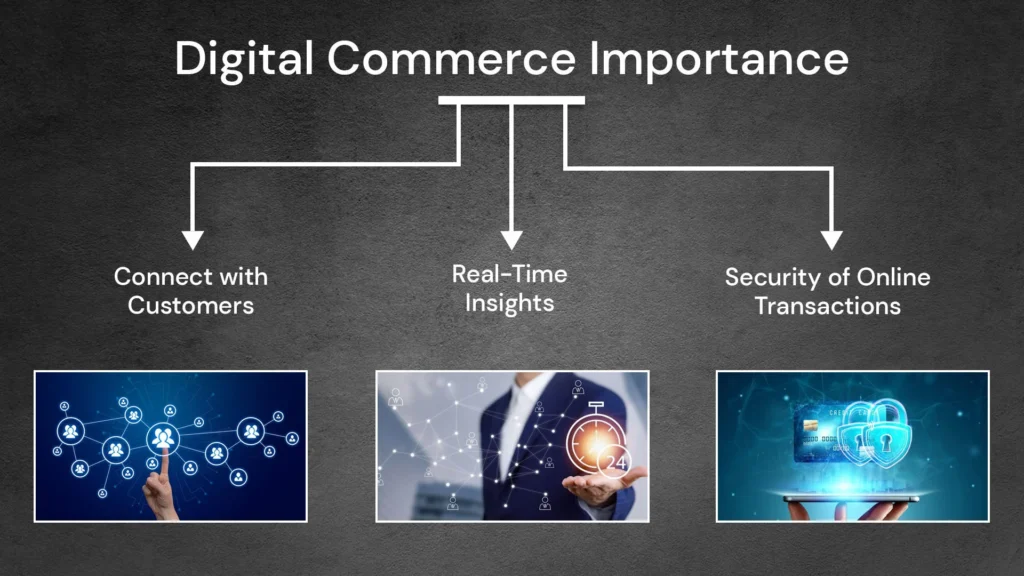Digital commerce entails the process of conducting online transactions for the purchase and sale of goods and services. The advent of digital e-Commerce platforms has brought about a revolution in the way we shop. These platforms not only facilitate convenient online shopping experiences but also empower retailers with enhanced control over their inventory and marketing strategies. The benefits offered by digital commerce are hard to overlook, ranging from time-saving convenience to unrestricted access to information around the clock.
What is Digital Commerce?
Digital commerce platform can be described as the evolution of e-Commerce, which involves online transactions for buying and selling goods, typically through websites. It represents a process where purchases are made online without human involvement. Although the distinction may seem slight, digital commerce encompasses a fully automated approach, encompassing various stages from marketing and sales to product delivery. While achieving complete automation may be ambitious, certain major retail conglomerates worldwide have already begun adopting this system.

Digital commerce utilizes all the digital marketing strategies that help reach a wide audience. Although achieving complete automation in digital commerce is still a work in progress, some prominent retail companies worldwide have already embraced and implemented this system.
How does Digital Commerce Work?
The journey commences when a customer encounters a brand or product online. This initial interaction can take various forms, such as seeing an advertisement on a social media feed, coming across the brand’s domain name in search engine results, or finding a product listing on a retail aggregator platform.
For instance, let’s consider a customer shopping on a popular commerce platform like Amazon. The platform utilizes a sophisticated algorithm that generates personalized search pages for each customer based on a range of factors. The order in which items appear on the page can vary significantly from one customer to another, taking into account individual customer behavior, geographic location, and numerous other variables.
Each purchase made contributes to the optimization of future marketing efforts. Analytics play a crucial role in informing how products are advertised and presented on websites and even in the handling of customer support and inquiries. As a result, digital commerce focuses less on moving purchases from one point to another and more on collecting and utilizing customer data to continuously enhance the online shopping experience.
In essence, it revolves around leveraging customer data to drive ongoing optimization of the online shopping journey, starting from the initial interaction with the brand or product and extending throughout the entire purchasing process.
Why Is Digital Commerce Important?
It holds significant importance for several reasons. It serves as a crucial avenue for businesses to connect with customers. In a landscape saturated with numerous offline and online options, it can be challenging for customers to find their desired products or services. However, online transactions allow businesses to gain real-time insights into customer behavior, enabling them to identify popular offerings.

By embracing online sales, companies can tap into a rapidly growing global market fueled by technological advancements such as widespread mobile phone usage and the popularity of search engines like Google. Given that many individuals now prefer shopping on their mobile devices, companies that prioritize providing exceptional mobile experiences are poised to thrive in the digital era.
When individuals make online purchases, sensitive information like credit card numbers is transmitted over the internet, potentially vulnerable to cyberattacks. However, thanks to encryption technologies like SSL (Secure Socket Layer), businesses can safeguard this information, providing a secure environment for online transactions. Digital commerce offers a vital means of customer connection, enables businesses to expand their global customer base, and ensures online transactions’ security. Embracing this form of commerce is essential for businesses to thrive in the dynamic digital landscape and meet the evolving needs and preferences of customers.
Digital Commerce vs. eCommerce
Ecommerce refers to the online selling of goods and services, typically conducted through a dedicated website where customers make purchases and the products are subsequently shipped. However, ecommerce represents only a single component of the broader realm of digital commerce.

Digital Commerce encompasses a wide range of processes and technologies that contribute to the entire customer buying journey, from customer acquisition to customer retention. It encompasses various elements, such as search engine optimization (SEO) to improve the visibility of an ecommerce site on search engines like Google, retargeted advertising aimed at marketing products to users who have previously visited an ecommerce website, payment technologies, and the logistical strategies employed to ensure faster and more efficient product delivery from the warehouse to the customer’s doorstep.
Moreover, digital commerce solutions go beyond traditional ecommerce by embracing innovative advancements. An AI-driven email automation can further enhance customer engagement by providing personalized recommendations and streamlining communication through automated email interactions.
In summary, ecommerce focuses on online transactions through dedicated websites. Digital commerce, on the other hand, encompasses a broader spectrum of processes and technologies that facilitate the customer’s progression along the marketing funnel, incorporating strategies for customer acquisition and retention and embracing futuristic technologies to enhance the overall buying experience.
Challenges of Digital Commerce Platform
Every facet of e-commerce business encounters challenges and obstacles. The challenges can vary depending on the market and the industry. But some common obstacles can be found in the current market.

Let’s examine some prominent issues and explore potential solutions to address them.
1. Maintaining Consumer Satisfaction
Maintaining consumer satisfaction is pivotal for the success of an e-commerce business. Nonetheless, staying abreast of evolving consumer expectations poses a growing challenge for the industry. Today’s customers seek swift delivery, complete transparency in package tracking, convenient delivery choices, and diverse payment options. Accommodating these expectations necessitates a flexible and adaptable supply chain that caters to consumer needs. However, such adaptability can introduce disruptions such as escalated shipping expenses and potential revenue loss for e-commerce enterprises.
2. High Competition
At present, the global market is flooded with over 5 million e-commerce platforms. This immense proliferation of online businesses has fostered an intensely competitive landscape within the e-commerce industry. To thrive amidst this competition, numerous companies are striving to enhance their services and devise fresh sales strategies to attract a larger customer base. However, continual service improvement and the implementation of new marketing campaigns necessitate substantial financial investments and a significant allocation of resources. Consequently, many online businesses face the tough choice of either closing down entirely or enduring financial losses and minimal profit margins as they contend with their counterparts in the e-commerce realm.
3. Reverse Logistics
Approximately 30% of online consumers return their orders for various reasons, emphasizing the significance of a robust return policy. An efficient reverse logistics system is essential for ensuring a positive customer experience. Processing return orders not only incur additional costs for the e-commerce industry but also initiates a fresh cycle within the supply chain. Compounding this challenge is the rise in return fraud, particularly associated with cash-on-delivery transactions, which can severely impact online businesses.
4. Identity Verification
Ensuring data security is a paramount concern for consumers engaging in online shopping. E-commerce platforms frequently face the risk of data breaches and cyber-attacks. The compromise of cybersecurity measures can result in a loss of consumer trust, ultimately impacting the profitability of the platform. Even the smallest vulnerability can serve as an entry point for hackers to infiltrate the system and inflict irreparable harm.
Identity theft and fraud from consumers pose additional vulnerabilities for e-commerce platforms. Fraudulent individuals often employ fake names, phone numbers, addresses, and stolen payment information to make unauthorized purchases. Verifying each consumer using an e-commerce platform presents significant challenges and can entail substantial costs.
5. Finding the right logistics partner
The logistics aspect of e-commerce is crucial for the growth potential of online businesses. It encompasses critical processes such as inventory and warehouse management, order fulfillment, and, notably, last-mile delivery. Thus, selecting the appropriate logistics partner holds great significance, as even a single misstep can disrupt the supply chain operations and directly impact the profitability of the e-commerce enterprise.
6. Adapting Modern Technology
In a swiftly evolving landscape of market trends and technology, e-commerce businesses encounter the ongoing challenge of swiftly adapting to these transformations. Failing to do so can result in falling behind competitors, leading to the loss of customers and missed growth opportunities. Successfully adapting to emerging technologies and trends necessitates the implementation of an agile business model. However, smaller-scale online businesses may face difficulties in introducing such flexibility due to limited resources and revenue constraints.
7. Cross-Border E-commerce
E-commerce offers a global reach, and numerous platforms leverage this opportunity by offering worldwide shipping to enhance their scalability. However, cross-border e-commerce comes with its challenges. High currency conversion rates, customs fees, elevated shipping costs, security concerns, lack of transparency, and slow transactions pose obstacles that can make consumers hesitant about shopping internationally.
8. Omnichannel Support
It refers to the utilization of non-traditional fulfillment options, such as pop-up distribution centers and micro-fulfillment centers, enhancing the operational capabilities of e-commerce businesses. Omnichannel support involves providing e-commerce services across various platforms, including websites and mobile apps. Adopting omnichannel support and distribution adds versatility to the e-commerce industry while saving both time and money. However, challenges arise when the channels are not properly managed, leading to issues such as reduced platform efficiency, revenue loss, and customer dissatisfaction.
9. Customer Retention
Establishing a loyal customer base proves to be more cost-effective than constantly acquiring new customers. Nonetheless, retaining customers can be a challenging endeavor, as even the slightest inadequacy can discourage them from returning to an online store. Factors such as poor user experience, absence of personalization, unpredictable delivery timelines, and ineffective marketing practices contribute to low customer retention rates for e-commerce platforms.
10. Inefficient Order Fulfillment
Among the various aspects of e-commerce, order fulfillment proves to be the most demanding and unpredictable. Challenges such as delays, incorrect orders, product damage, suboptimal route planning, and verification of proof-of-delivery (POD) contribute significantly to inefficient order fulfillment. Inadequate order fulfillment not only results in customer dissatisfaction but also leads to increased costs, directly impacting the growth of the e-commerce company.
Digital Commerce Solutions
In the fast-paced digital landscape, businesses must adapt to the evolving needs and preferences of consumers. Digital commerce solutions play a pivotal role in ensuring that businesses can effectively navigate the online marketplace and provide seamless customer experiences.

1. Delivering Consistent Customer Experiences
One of the cornerstones of the successful digital form of commerce is delivering consistent and exceptional customer experiences across multiple channels and touchpoints. Today’s customers expect a seamless journey from browsing products to making a purchase, regardless of the device or platform they are using. Digital solutions enable businesses to provide a unified experience by integrating various systems, such as content management, inventory management, and customer relationship management. This integration ensures that customers receive relevant and personalized experiences, regardless of the channel they engage with.
2. Meeting New Technology Expectations
Digital marketing is ever-evolving and to stay ahead. Businesses must meet the expectations of tech-savvy consumers. Digital commerce solutions help businesses adapt to these changing technology expectations. For instance, the rise of mobile commerce has led to the demand for responsive and mobile-friendly websites or even dedicated mobile apps. Additionally, emerging technologies such as augmented reality (AR) and virtual reality (VR) are transforming the way customers interact with products online. Implementing digital solutions enables businesses to embrace these new technologies and deliver innovative experiences to their customers.
3. Generating Enough Traffic
In the crowded digital marketplace, generating sufficient traffic to e-commerce platforms is a significant challenge. Without a steady flow of visitors, businesses may struggle to achieve their revenue goals. Digital commerce solutions encompass a range of strategies and tactics to drive traffic to e-commerce websites. These may include search engine optimization (SEO) techniques to improve visibility in search engine results, content marketing to attract and engage audiences, social media marketing to reach and interact with target customers, and paid advertising campaigns to target specific demographics. Through effective digital solutions, businesses can increase their online visibility and attract a steady stream of potential customers.
4. Converting and Retaining Customers
Driving traffic to an e-commerce website is only part of the equation. Converting visitors into paying customers and retaining them for repeat purchases are equally crucial for the success of any digital commerce venture. Digital solutions offer tools and techniques to optimize conversion and enhance customer retention. Personalization and recommendation engines analyze customer data to offer tailored product suggestions, improving the chances of conversion. Streamlined checkout processes, secure payment gateways, and hassle-free returns and refunds enhance the overall customer experience and build trust. Additionally, customer relationship management (CRM) tools help businesses nurture and engage with their customers, ensuring a higher likelihood of repeat purchases and long-term loyalty.
How Spyne is Driving the Digital Commerce Experience
Spyne is an outstanding solution when seeking a dependable and feature-rich digital catalog maker. Renowned for its exceptional capabilities, Spyne empowers businesses to create impressive and practical digital catalogs, ultimately enhancing sales performance. Let’s explore why Spyne stands out as one of the best digital catalog makers in the market:
1. Intuitive User Interface
Spyne boasts an intuitive interface that enables businesses to effortlessly create professional-looking digital product catalogs. With its drag-and-drop editor, pre-designed templates, and customizable layouts, even those without extensive design or technical skills can easily align their catalogs with their brand identity.
2. Versatile and Interactive Features
Spyne offers a range of interactive features that enhance the browsing experience for customers. Businesses can incorporate zoomable product images, 360-degree views, product videos, and clickable links within their digital catalogs. These engaging elements allow customers to explore products in detail and make well-informed purchasing decisions.
3. Seamless Ecommerce Integration
Spyne seamlessly integrates with e-commerce platforms, enabling businesses to integrate their digital catalogs with their online stores. This integration facilitates a smooth purchasing process, allowing customers to add products to their shopping carts and complete purchases without leaving the catalog interface. As a result, conversion rates increase, leading to boosted sales.
4. Customizable Branding
Spyne empowers businesses to customize their digital product catalogs to align with their brand identity. Utilizing Spyne’s AI photo editor, businesses can easily incorporate branding elements such as logo placement, color customization, and background selection for the website images. Ecommerce photo editing ensures a consistent brand experience throughout the digital catalogs, strengthening brand recognition and customer trust and also improving customer retention through ecommerce websites. Now you can make ecommerce photography easy with Spyne AI and empower your brand like never before.
5. Responsive Design
Spyne’s digital catalogs are designed to be responsive, providing optimal viewing experiences across various devices and screen sizes. Additionally, the AI system automatically edits images according to the guidelines specified by different e-commerce platforms. By choosing a platform, businesses can effortlessly optimize their product pictures, ensuring easy listings for their business.
6. Excellent Customer Support
Spyne offers reliable customer support throughout the catalog creation process. The dedicated customer support team is readily available to address any queries or concerns, ranging from troubleshooting technical issues to providing guidance on catalog design.
Conclusion
Digital commerce has made a significant impact on the global stage, emerging as the preferred method for conducting online transactions involving the buying and selling of goods and services. The future of commerce lies in the realm of digitalization. Digital commerce is no longer just a passing trend; it has become an indispensable requirement for businesses striving to maintain their relevance in today’s dynamic market.
Embrace our cutting-edge Digital Commerce solutions to deliver an exceptional shopping experience to your valued customers. Seize the opportunity to elevate your online business to new heights and ensure its continued growth and success.

















